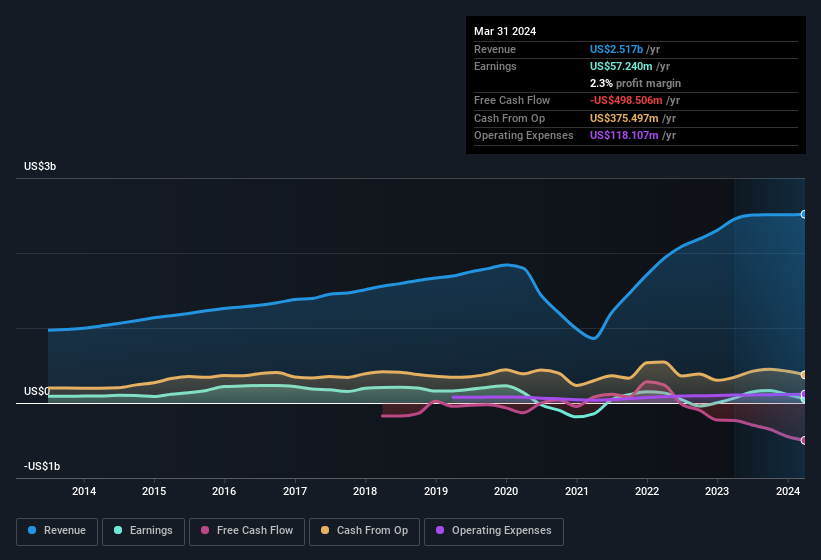- United States
- /
- Airlines
- /
- NasdaqGS:ALGT
Allegiant Travel's (NASDAQ:ALGT) Anemic Earnings Might Be Worse Than You Think

Despite Allegiant Travel Company's (NASDAQ:ALGT) most recent earnings report having soft headline numbers, its stock has had a positive performance. We did some analysis and found some positive factors that investors might be paying attention to rather than profit.
Check out our latest analysis for Allegiant Travel

Examining Cashflow Against Allegiant Travel's Earnings
As finance nerds would already know, the accrual ratio from cashflow is a key measure for assessing how well a company's free cash flow (FCF) matches its profit. In plain english, this ratio subtracts FCF from net profit, and divides that number by the company's average operating assets over that period. You could think of the accrual ratio from cashflow as the 'non-FCF profit ratio'.
That means a negative accrual ratio is a good thing, because it shows that the company is bringing in more free cash flow than its profit would suggest. While it's not a problem to have a positive accrual ratio, indicating a certain level of non-cash profits, a high accrual ratio is arguably a bad thing, because it indicates paper profits are not matched by cash flow. Notably, there is some academic evidence that suggests that a high accrual ratio is a bad sign for near-term profits, generally speaking.
Over the twelve months to March 2024, Allegiant Travel recorded an accrual ratio of 0.26. Therefore, we know that it's free cashflow was significantly lower than its statutory profit, which is hardly a good thing. Over the last year it actually had negative free cash flow of US$499m, in contrast to the aforementioned profit of US$57.2m. We also note that Allegiant Travel's free cash flow was actually negative last year as well, so we could understand if shareholders were bothered by its outflow of US$499m. However, that's not all there is to consider. The accrual ratio is reflecting the impact of unusual items on statutory profit, at least in part.
That might leave you wondering what analysts are forecasting in terms of future profitability. Luckily, you can click here to see an interactive graph depicting future profitability, based on their estimates.
The Impact Of Unusual Items On Profit
Unfortunately (in the short term) Allegiant Travel saw its profit reduced by unusual items worth US$44m. If this was a non-cash charge, it would have made the accrual ratio better, if cashflow had stayed strong, so it's not great to see in combination with an uninspiring accrual ratio. While deductions due to unusual items are disappointing in the first instance, there is a silver lining. When we analysed the vast majority of listed companies worldwide, we found that significant unusual items are often not repeated. And that's hardly a surprise given these line items are considered unusual. Assuming those unusual expenses don't come up again, we'd therefore expect Allegiant Travel to produce a higher profit next year, all else being equal.
Our Take On Allegiant Travel's Profit Performance
Allegiant Travel saw unusual items weigh on its profit, which should have made it easier to show high cash conversion, which it did not do, according to its accrual ratio. Given the contrasting considerations, we don't have a strong view as to whether Allegiant Travel's profits are an apt reflection of its underlying potential for profit. Keep in mind, when it comes to analysing a stock it's worth noting the risks involved. For example, Allegiant Travel has 4 warning signs (and 1 which is a bit concerning) we think you should know about.
In this article we've looked at a number of factors that can impair the utility of profit numbers, as a guide to a business. But there are plenty of other ways to inform your opinion of a company. Some people consider a high return on equity to be a good sign of a quality business. So you may wish to see this free collection of companies boasting high return on equity, or this list of stocks with high insider ownership.
New: Manage All Your Stock Portfolios in One Place
We've created the ultimate portfolio companion for stock investors, and it's free.
• Connect an unlimited number of Portfolios and see your total in one currency
• Be alerted to new Warning Signs or Risks via email or mobile
• Track the Fair Value of your stocks
Have feedback on this article? Concerned about the content? Get in touch with us directly. Alternatively, email editorial-team (at) simplywallst.com.
This article by Simply Wall St is general in nature. We provide commentary based on historical data and analyst forecasts only using an unbiased methodology and our articles are not intended to be financial advice. It does not constitute a recommendation to buy or sell any stock, and does not take account of your objectives, or your financial situation. We aim to bring you long-term focused analysis driven by fundamental data. Note that our analysis may not factor in the latest price-sensitive company announcements or qualitative material. Simply Wall St has no position in any stocks mentioned.
About NasdaqGS:ALGT
Allegiant Travel
A leisure travel company, provides travel and leisure services and products to residents of under-served cities in the United States.
Good value with reasonable growth potential.

